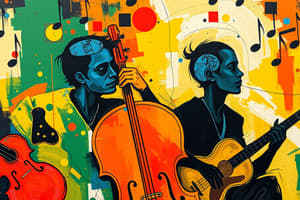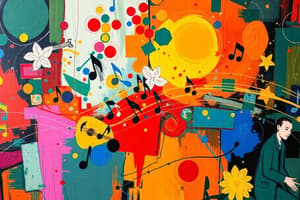Podcast
Questions and Answers
Match the following music genres with their origins:
Match the following music genres with their origins:
Samba and bossa nova = Brazil Arabic and Turkish songs = Middle East Jazz, blues, rock, and hip-hop = 20th century Piano = 19th century
Match the following hormones with their association to music:
Match the following hormones with their association to music:
Dopamine = Social bonding Oxytocin = Pleasure
Match the following benefits of music therapy with their effects:
Match the following benefits of music therapy with their effects:
Improve mood = Alleviate pain Reduce anxiety = Enhance cognitive function Alleviate pain = Reduce anxiety Enhance cognitive function = Improve mood
Match the following cultural influences with their impact on musical repertoire:
Match the following cultural influences with their impact on musical repertoire:
Match the following music-related activities with their benefits:
Match the following music-related activities with their benefits:
Match the following musical elements with their universal appeal:
Match the following musical elements with their universal appeal:
Match the following historical periods with their musical contributions:
Match the following historical periods with their musical contributions:
Match the following descriptions with the role of music in human existence:
Match the following descriptions with the role of music in human existence:
Match the following technological advancements with their impact on music:
Match the following technological advancements with their impact on music:
Match the following statements with their significance in music evolution:
Match the following statements with their significance in music evolution:
Flashcards are hidden until you start studying
Study Notes
Music: A Universal Language of Emotion and Culture
Music is an integral part of human existence, a language that transcends borders and barriers, conveying emotions and telling stories in a way that words alone cannot capture. As you delve into this fascinating world, you'll find that music is not only a form of entertainment but also a reflection of cultural heritage and a tool for personal expression.
The Universal Language of Music
The power of music lies in its ability to evoke emotions and connect us to our fellow humans, regardless of the language we speak or the color of our skin. Rhythms, melodies, harmonies, and timbres are universal elements that can be understood and appreciated universally. From a simple melody sung by a child to a complex symphony performed by a world-class orchestra, music has the unique ability to create shared experiences and foster empathy.
The Evolution of Music
Music has a rich history that has evolved alongside human civilization. Early forms of music, such as cave paintings and bone flutes, date back to prehistoric times. With the rise of technology, music has continued to evolve, incorporating new instruments and methods of creation. For instance, the ancient Greeks invented the first string instrument, while the Middle Ages saw the rise of polyphony with the development of religious chants and carols. The Renaissance brought forth the lute and the harpsichord, while the Baroque period introduced the violin and the pipe organ. The 19th century saw the emergence of the piano, while the 20th century witnessed the birth of jazz, blues, rock, and hip-hop.
The Science Behind Music
Music affects our brains in profound ways, triggering the release of dopamine and oxytocin, hormones that are associated with pleasure and social bonding. Music therapy has been shown to improve mood, alleviate pain, reduce anxiety, and enhance cognitive function. The intricate patterns of music engage various regions of the brain, including those responsible for memory, emotion, and motor skills.
Music and Culture
Music plays an essential role in shaping and preserving cultural identities. Each culture has its unique musical repertoire, influenced by historical events, social norms, and environmental factors. For instance, the sounds and rhythms of samba and bossa nova, which originated in Brazil, reflect the country's rich cultural heritage. Similarly, the music of the Middle East, such as Arabic and Turkish songs, is rooted in regional traditions and religious beliefs.
Music and Personal Expression
Music is a powerful tool for self-expression, allowing us to explore our emotions and communicate our inner thoughts in ways that words alone cannot achieve. Whether through songwriting, composing, or performing, music provides an opportunity to connect with others on a deeper, more personal level. Composing music tests our creativity and problem-solving skills, while performing music builds confidence, discipline, and teamwork.
Conclusion
Music is more than just a form of entertainment; it is a universal language that transcends borders and barriers. From the earliest human civilizations to the present day, music has played an essential role in shaping our cultures and expressing our emotions. As we continue to explore the mysteries of music, we uncover new ways to connect with others, foster empathy, and enhance our own personal growth. So, the next time you listen to your favorite song, remember that you're not just listening—you're learning a new language, one note at a time.
Studying That Suits You
Use AI to generate personalized quizzes and flashcards to suit your learning preferences.



